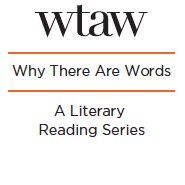Why There Are Words Literary Reading Series presents:
An Interview with Lysley Tenorio
By: Nancy Au
Lysley Tenorio is the author of the brand new debut collection of stories Monstross (Ecco Harper Collins, February 2012). His stories have appeared in The Atlantic, Zoetrope: All-Story, Ploughshares, Manoa, and The Best New American Voices and Pushcart Prize anthologies. A Whiting Writer’s Award winner and a former Stegner Fellow at Stanford University, he has received fellowships from the University of Wisconsin, Phillips Exeter Academy, Yaddo, The MacDowell Colony, and the National Endowment for the Arts. Born in the Philippines, he currently lives in San Francisco, and is an associate professor at Saint Mary’s College of California.

1.) Your story, Monstress, which I listened to you read on KQED Arts, had me spellbound, laughing and crying, shaking my head in wonderment. I recently learned that May is Asian-Pacific American Heritage Month. And just like your character Gaz Gazman, I thought, “Jackpot! Eureka! This is the real deal!” I need to interview Lysley Tenorio.
One of your characters in Monstress used the term, “chop-suey cinema,” to describe the splicing together of East and West genres. Your writing defies stereotypes. You do not stigmatize your Filipino characters. What advice can you give to writers who want to write about characters where English is a second language?
Lysley Tenorio (LT): If you mean to show the nuances, challenges, and metaphorical possibilities of English spoken as a second language, then you should render it accordingly and realistically. If that isn’t important, I think the best thing to do is to not worry about it, to simply keep the dialogue sharp and concise, and always meaningful and surprising.
2.) In an interview that you gave for St. Mary’s College, (where you are an Associate Professor), you spoke of writing with an emotional heart and, that once we identify what the heart is, the story will come. I love this. What do you tell your students about writing with heart but avoiding sentimentality? What is sentimentality in writing?
LT: Sentimental writing demands an emotional response from the reader that hasn’t yet been earned, and is often clichéd, lazy, and meaningless. Even a well-written scene that is dramatically persuasive can border on sentimentality, when it lingers too long on a moment that indulges and ultimately isolates—and therefore decontextualizes—broad and simplistic emotional moments. As for telling my students about writing with heart? I’m not sure I do that. Maybe the closest thing to it is when I tell them to render each moment as authentically as possible—to render intelligently and persuasively the relationships between character, action, dialogue, setting, etc., in every single moment.
3.) In that same interview, you spoke of the beauty in short story writing, that the truest test is making sure that every word counts, paring away the excess. This reminds me of your characters in Monstress who pared down or abbreviated their names, “declunked it down to its smoothest sound.” Sounds. Sound in names, spoken accents, individual vowels and consonants. As a teenage Chinese-American growing up in San Francisco, I paid attention to these diverse sounds; the less sound a kid made, the less different they were, and this was a “good” thing. Your characters often battle with a similar sense of belonging. What are other themes that you write about? And why?
LT: It takes me a while to recognize some of the other thematic meanings of my work. But I think I often deal with the idea of beauty, of the possible future vs. the definitive past, trying to reconcile the ridiculous with the serious.
4.) In Monstress, you described Gaz’s homemade movie set as “…attempting magic from junk.” In some ways, I feel that this is what we fiction writers try to do. Put together pieces of memory and magic, and call it imagination. What advice can you give to writers who say that they’ve run out of ideas to write about?
LT: Read The New Book of Lists. It’s full of wonderfully weird and unexpectedly moving facts (“Secret Armies of the CIA,” “Days of Extinction for 8 Birds,” etc.). And if you read the Odd News sections on any news site—CNN, Yahoo, MSNBC—you’re bound to find some scenario worthy of reimagining. And if a fiction writer has run out of ideas because she/he has nothing else to draw from their own personal experience, then that’s a good thing: if you want to write fiction, get out of your life; it tends to be a lot more fun.





